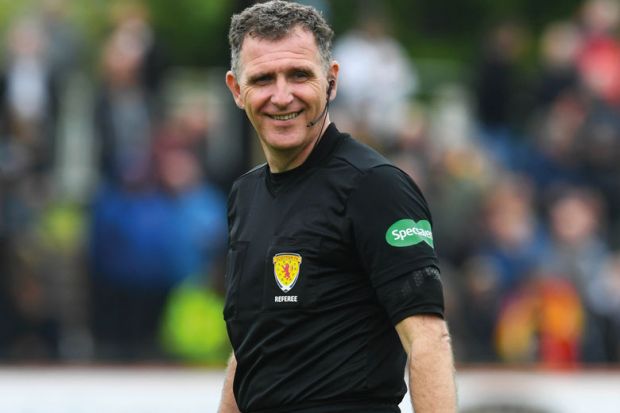Scotland’s new commissioner for fair access says there should be a “mature conversation” about how to meet the government-set target on increasing the number of deprived students in universities, warning that the target “can’t become a burden” and that “there is a debate to be had” on its metrics.
Following his appointment by the Scottish government in December, John McKendrick will continue to work as professor of social justice at Glasgow Caledonian University. He is also a former grade one football referee who took charge of games in the Scottish Premiership.
“My top priority is to listen,” Professor McKendrick told Times Higher Education of his initial focus after succeeding Sir Peter Scott in the access post. “I’ve never been as popular in my life,” added the co-director of GCU’s Scottish Poverty and Inequality Research Unit on the flurry of emails coming from the sector.
Indeed, he has not had so many people get in touch with him “since I made a very controversial decision [in a match] at Greenock Morton a few years ago and had about 30 Facebook friend requests that evening when I arrived home. Although this is a much nicer set of requests.”
The Scottish government has set a target that students from the 20 per cent most deprived communities will account for 20 per cent of entrants to Scottish universities by 2030 (the target is known as SIMD, for the Scottish Index of Multiple Deprivation it relies on), where an interim target of 16 per cent has already been met.
There has been intense political debate: Nicola Sturgeon, the Scottish first minister, was recently challenged by Labour on figures showing that no students from more affluent areas were accepted on to the University of Edinburgh’s law course last year, defending the picture on access as “good news”.
The target is “something that’s cast in stone, that’s something we’re working towards”, said Professor McKendrick. “But that can’t become a burden. What we can’t have is just a blind focus on that to the point that there are unintended consequences on other important issues that fall off the agenda.”
It would be “better for everyone if there was more proportionate balance in Scottish universities”, but there was also a need to focus on deprived students’ experience while at university and their outcomes afterwards, he added.
There was a need for a “mature conversation about…what would it actually take in practice for that 20 per cent to be achieved”, and it was “very unrealistic to think that’s going to be 20 per cent at every institution”, he continued.
In a publicly funded system where Scottish student numbers are capped, does an increase in the number of deprived students necessitate a decrease in the number of their more affluent peers?
“There are real concerns some people have that what might happen is if we are blindly focused on, and have a narrow focus on, meeting that target and that’s what counts, then we might rob Peter to pay Paul; and the people who would lose out would be young people from the 20 to 40 per cent most deprived areas…That’s something we have to be sharply focused on,” Professor McKendrick said.
“There’s a debate to be had about whether the area-based metric is the right metric to use in order to ascertain whether we’re widening access…There’s no use believing in the issue but thinking the target somehow is flawed.”
He added: “Whether it needs to be a basket of indicators is something worth exploring.”
Meanwhile, pandemic disruption to education and the cost-of-living crisis were “inevitably going to have consequences for the target group we have for this widening participation agenda”, he said, also emphasising that that agenda was “a school agenda as well”.
Professor McKendrick described himself as coming from a “super-traditional” background, growing up in an area among the 10 per cent most deprived in Scotland.
There is some overlap between his research and football: he has a “pet project where I looked at the growing-up stories of successful Scottish footballers”, examining how they “celebrate the fact they grew up in a difficult area” because overcoming those challenges “made them successful”.
As a referee, he was a key figure in a 2010 referees’ strike over the football authorities’ failure to protect them from abuse and prided himself on managing player discipline “without being overindulgent in the use of red and yellow cards”, before stepping down as a grade one referee in 2020.
“Despite what [fans] say about referees, they very often do not want to be the centre of attention,” he said. “Taking that into the current role, I don’t want to be the centre of attention…My style of going about things is not to make grand statements; it’s to learn from others.”
POSTSCRIPT:
Print headline: ‘There’s a debate to be had on target metrics’
Register to continue
Why register?
- Registration is free and only takes a moment
- Once registered, you can read 3 articles a month
- Sign up for our newsletter
Subscribe
Or subscribe for unlimited access to:
- Unlimited access to news, views, insights & reviews
- Digital editions
- Digital access to THE’s university and college rankings analysis
Already registered or a current subscriber? Login








